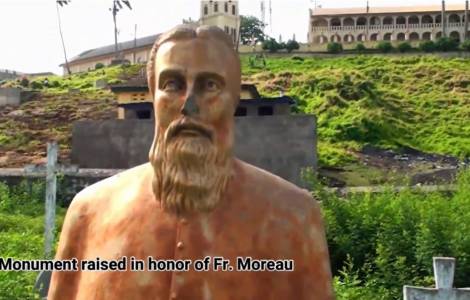
SMA
Kumasi (Agenzia Fides) - In 1880 Father Auguste Moreau, of the Society of African Missions (SMA), together with Father Eugene Murat, arrived in Elmina, the oldest European settlement in West Africa.
According to chronology, a group of Portuguese priests had been active in Ghana as early as 1471, and Father Francesco Borghero (SMA) was the first African missionary to be active in Cape Coast on the Gulf of Guinea and Accra. However, it took a few years for the Society of African Missions to actually take root, and Father Moreau was its real pioneer.
The 140th anniversary of Father Moreau's arrival in Manhyia, in the greater Kumasi area of the Ashanti region, was the focus of a meeting recently hosted by the Society for the African Missions in Kumasi, the capital of the former Ashanti kingdom. The Ashanti people controlled much of Ghana's territory before the arrival of Europeans and were often in conflict with the conquerors. Even in the 21st century, they still form the largest ethnic community in Ghana. The first European explorers to arrive on the coast were the Portuguese in 1471.
The SMA event, entitled 'Kumasi meeting point between religion, royalty and diplomacy' was intended to provide an opportunity for those involved to reflect on the contribution Father Auguste Moreau made to the development of Ghana and Kumasi in particular since his arrival. "Moreau's dedication to evangelization laid the foundation for the growth of Catholicism in Kumasi and throughout Ghana," wrote Father René D. Yao (SMA). "Today in Ghana there are four archdioceses and eleven dioceses with over 1,350 priests, religious and seminarians. The conference showed how mission and diplomacy can help build the country."
"In the address of the Provincial Superior of SMA Ghana, Fr. Paul Saa-Dade Ennin - adds Fr. René - the need to bring missionary reflection to the intellectual level was emphasized, emphasizing that religion is about faith, nation about the lifestyle and diplomacy is about relationships," continues Fr. Renè.
The meeting was attended by, among others, the Apostolic Nuncio in Ghana, Archbishop Henryk Mieczyslaw Jagodzinski, Archbishop Gabriel J.Y. Anokye of Kumasi, Professor Rita Akosua Dickson, Vice Rector of the Kwame Nkrumah University of Science and Technology (KNUST).
The contribution of the Society of Africa Missions goes beyond evangelization and also includes education, health programs for youth and women. A notable program is the St. Martin Deaf Ministry founded by Father René himself. The young Ivorian priest, engaged in this project in Accra with deaf people, knows sign language and started with a small group of deaf people to meet deaf children, trained staff to teach the language and the activity continues to expand.
Father René explained that the ministry aims to contribute to the emergence of an inclusive community that recognizes and respects the humanity of individuals, regardless of their socio-economic and physical status. This project aims to give the deaf a voice through education and training opportunities so that they can lead a fulfilling and independent life. The missionaries aim to bridge the communication gap between the hearing and deaf communities by using Ghanaian Sign Language (GSL) as a means of communication.
As the missionary points out, the Society's contributions to Africa Missions to Ghana and Kumasi are extensive and far-reaching. "The pastoral care of the deaf at St. Martin is a testament to the Africa Missionaries' commitment to creating an inclusive community that recognizes and respects the humanity of each individual," concludes Father René. "As we celebrate the anniversary of Father Moreau's arrival 140 years ago, today we can see how the seed he planted continues to bear fruit and positively impact life in Ghana today."
In September 1879 the area, also known as the Gold Coast, was established as an Apostolic Prefecture and entrusted to the Society of African Missions. The first baptism on the Gold Coast was that of a one-year-old child in Elmina. Two missionary sisters from the Congregation of Our Lady of the Apostles (OLA) arrived in Elmina in 1883 and opened the first girls' school there. In 1889 the first mission was established in Cape Coast. In 1890 the church in Elmina was baptized, Keta became the seat of the Society for African Missions and the sisters opened another girls' school in Cape Coast. In 1896 Cape Coast was erected Vicariate Apostolic and the first Bishop was Maximilien Albert (SMA).
The Gold Coast was a British Crown colony on the Gulf of Guinea in West Africa from 1821 until its independence in 1957 as Ghana.
The term Gold Coast is also often used to describe all four separate jurisdictions that were under the administration of the Governor of the Gold Coast. Specifically they were the Gold Coast itself, Ashanti, the Protectorate of the Northern Territories and the British Togoland Trust Territory. (AP/RY) (Agenzia Fides, 26/4/2023)